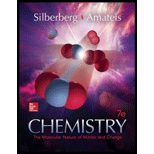
Interpretation:
For the given set of reactions in problem 20.51 the free energy
Concept introduction:
Enthalpy is the amount energy absorbed or released in a process.
The enthalpy change in a system
Where,
Entropy is the measure of randomness in the system. Standard entropy change in a reaction is the difference in entropy of the products and reactants.
Where,
Standard entropy change in a reaction and entropy change in the system are same.
Free energy is the term that is used to explain the total energy content in a thermodynamic system that can be converted into work. The free energy is represented by the letter G. All spontaneous process is associated with the decrease of free energy in the system. The equation given below helps us to calculate the change in free energy in a system.
Where,
Free energy (Gibbs free energy) is the term that is used to explain the total energy content in a thermodynamic system that can be converted into work. The free energy is represented by the letter
Where,
Answer to Problem 20.53P
Reaction-A the standard free energy value is
Reaction-B the standard free energy value is
Reaction-C the standard free energy value is
Explanation of Solution
Reaction-A
Given,
The number of particle also decreases, indicating a decrease in entropy.
So, there
Standard enthalpy change is,
The enthalpy change for the reaction is calculated as follows,
The enthalpy change is negative. Hence, the enthalpy
Entropy change
Standard entropy change equation is,
Where,
Therefore, the
Next calculate the Free enrgy change
Standared Free energy change equation iss,
Free enrgy change
Calcualted enthalpy and entropy values are
These values are plugging above standard free energy equation,
Therefore, the standard free energy value is
Reaction-B
Given reaction is,
The number of particle also decreases, indicating a decrease in entropy.
So, there
Standard enthalpy change is,
The enthalpy change for the reaction is calculated as follows,
The enthalpy change is negative.
Hence, the enthalpy
Entropy change
Standard entropy change equation is,
Where,
Therefore, the
Next calculate the Free energy change
Standared Free energy change equation iss,
Free enrgy change
Calcualted enthalpy and entropy values are
These values are plugging above standard free energy equation,
Therefore, the standard free energy value is
Reaction-C
Given reaction is,
The number of particle also decreases, indicating a decrease in entropy.
So, there
Standard enthalpy change is,
The enthalpy change for the reaction is calculated as follows,
The enthalpy change is negative. Hence, the enthalpy
Entropy change
Standard entropy change equation is,
Where,
Therefore, the
Finally calculate the Free enrgy change
Standared Free energy change equation iss,
Free enrgy change
Calcualted enthalpy and entropy values are
These values are plugging above standard free energy equation,
Therefore, the standard free energy value is
Want to see more full solutions like this?
Chapter 20 Solutions
Chemistry: The Molecular Nature of Matter and Change - Standalone book
- Rank the following compounds in order of decreasing dipole moment. |>||>||| ||>|||>| |>|||>|| |||>||>| O ||>>||| H F H F H c=c || H c=c F F IIIarrow_forwardchoose the description that best describes the geometry for the following charged species ch3-arrow_forwardWhy isn't the ketone in this compound converted to an acetal or hemiacetal by the alcohol and acid?arrow_forward
- What is the approximate bond angle around the nitrogen atom? HNH H Harrow_forwardOH 1. NaOCH2CH3 Q 2. CH3CH2Br (1 equiv) H3O+ Select to Draw 1. NaOCH2 CH3 2. CH3Br (1 equiv) heat Select to Edit Select to Drawarrow_forwardComplete and balance the following half-reaction in acidic solution. Be sure to include the proper phases for all species within the reaction. S₂O₃²⁻(aq) → S₄O₆²⁻(aq)arrow_forward
- Q Select to Edit NH3 (CH3)2CHCI (1 equiv) AICI 3 Select to Draw cat. H2SO4 SO3 (1 equiv) HO SOCl2 pyridine Select to Edit >arrow_forwardComplete and balance the following half-reaction in basic solution. Be sure to include the proper phases for all species within the reaction. Zn(s) → Zn(OH)₄²⁻(aq)arrow_forwardb. ὋΗ CH3CH2OH H2SO4arrow_forward
- For the reaction A (g) → 3 B (g), Kp = 0.379 at 298 K. What is the value of ∆G for this reaction at 298 K when the partial pressures of A and B are 5.70 atm and 0.250 atm?arrow_forward14. Calculate the concentrations of Ag+, Ag(S2O3), and Ag(S2O3)23- in a solution prepared by mixing 150.0 mL of 1.00×10-3 M AgNO3 with 200.0 mL of 5.00 M Na2S2O3 Ag+ + S20 Ag(S203)¯ K₁ = 7.4 × 108 Ag(S203)¯ + S20¯ = Ag(S203) K₂ = 3.9 x 104arrow_forwardΗΝ, cyclohexanone pH 4-5 Draw Enamine I I CH3CH2Br THF, reflux H3O+ I Drawing Draw Iminium Ionarrow_forward
 ChemistryChemistryISBN:9781305957404Author:Steven S. Zumdahl, Susan A. Zumdahl, Donald J. DeCostePublisher:Cengage Learning
ChemistryChemistryISBN:9781305957404Author:Steven S. Zumdahl, Susan A. Zumdahl, Donald J. DeCostePublisher:Cengage Learning ChemistryChemistryISBN:9781259911156Author:Raymond Chang Dr., Jason Overby ProfessorPublisher:McGraw-Hill Education
ChemistryChemistryISBN:9781259911156Author:Raymond Chang Dr., Jason Overby ProfessorPublisher:McGraw-Hill Education Principles of Instrumental AnalysisChemistryISBN:9781305577213Author:Douglas A. Skoog, F. James Holler, Stanley R. CrouchPublisher:Cengage Learning
Principles of Instrumental AnalysisChemistryISBN:9781305577213Author:Douglas A. Skoog, F. James Holler, Stanley R. CrouchPublisher:Cengage Learning Organic ChemistryChemistryISBN:9780078021558Author:Janice Gorzynski Smith Dr.Publisher:McGraw-Hill Education
Organic ChemistryChemistryISBN:9780078021558Author:Janice Gorzynski Smith Dr.Publisher:McGraw-Hill Education Chemistry: Principles and ReactionsChemistryISBN:9781305079373Author:William L. Masterton, Cecile N. HurleyPublisher:Cengage Learning
Chemistry: Principles and ReactionsChemistryISBN:9781305079373Author:William L. Masterton, Cecile N. HurleyPublisher:Cengage Learning Elementary Principles of Chemical Processes, Bind...ChemistryISBN:9781118431221Author:Richard M. Felder, Ronald W. Rousseau, Lisa G. BullardPublisher:WILEY
Elementary Principles of Chemical Processes, Bind...ChemistryISBN:9781118431221Author:Richard M. Felder, Ronald W. Rousseau, Lisa G. BullardPublisher:WILEY





